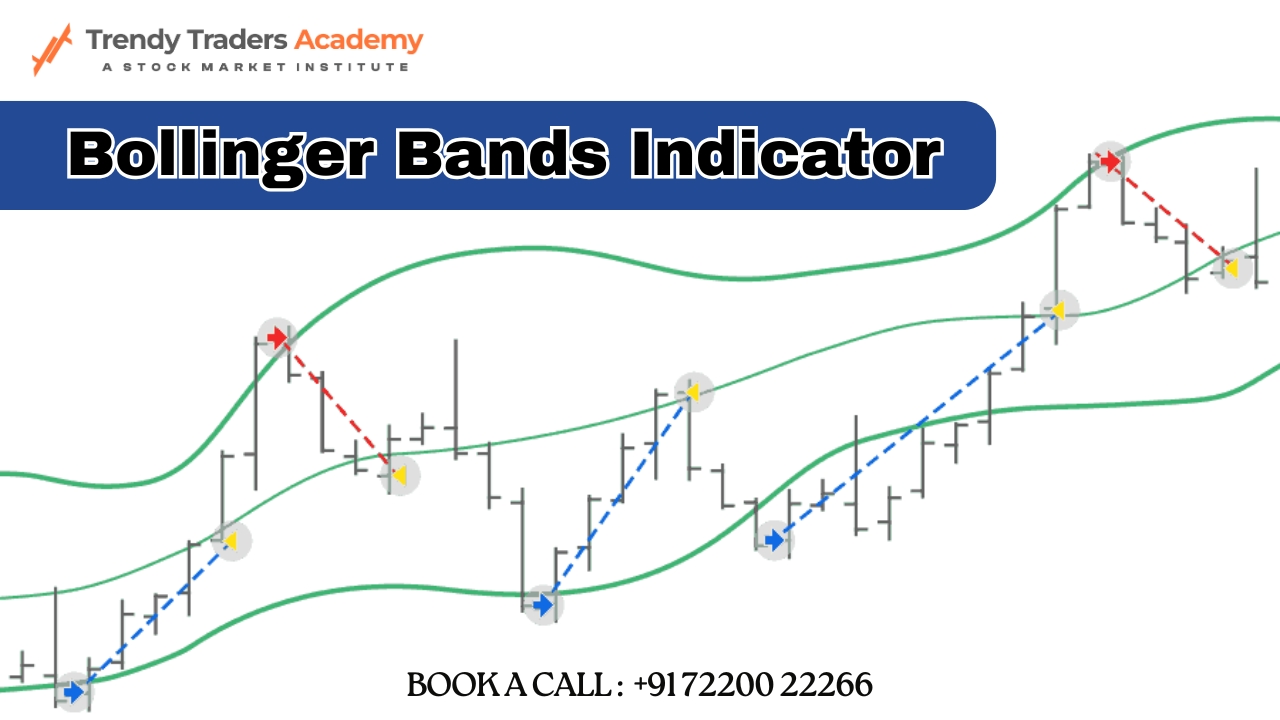
Bollinger Bands Indicator: A Complete Guide for Beginners
Introduction
If you've ever tried your hand at stock trading, you've likely come across Bollinger Bands. But what exactly are they? And how can they help you make better trading decisions? Imagine you're driving on a highway with guardrails on both sides—Bollinger Bands work in a similar way, guiding your trades within certain price limits.
In this article, we’ll break down Bollinger Bands in simple terms, how they work, and how you can use them to improve your trading strategy.
Discover how Bollinger Bands work and improve your trading skills. Enroll in a stock market course in Bangalore or trading classes Bangalore today!
What Are Bollinger Bands?
Bollinger Bands are a popular technical analysis tool developed by John Bollinger in the 1980s. They help traders understand market volatility and identify potential buy and sell signals.
Simply put, Bollinger Bands consist of three lines:
The middle band, which is a simple moving average (SMA).
The upper band, which represents the SMA plus two standard deviations.
The lower band, which represents the SMA minus two standard deviations.
These bands expand and contract based on market volatility, making them useful for traders looking to identify trends.
Understanding the Components of Bollinger Bands
To effectively use Bollinger Bands, it's essential to understand their components:
Middle Band: Represents the stock’s average price over a specific period.
Upper Band: Indicates a higher price range, often signaling overbought conditions.
Lower Band: Suggests a lower price range, often indicating oversold conditions.
How Bollinger Bands Are Calculated
The formula for Bollinger Bands is straightforward:
Middle Band = 20-day Simple Moving Average (SMA)
Upper Band = SMA + (2 × Standard Deviation)
Lower Band = SMA - (2 × Standard Deviation)
By using this formula, traders can determine whether a stock is trading within its normal range or experiencing significant volatility.
How to Use Bollinger Bands in Trading
Bollinger Bands help traders make informed decisions by providing insights into market trends. Here’s how:
Buying Opportunity: When the price touches the lower band and starts moving up, it may signal a buying opportunity.
Selling Opportunity: If the price reaches the upper band and starts falling, it might be a good time to sell.
Sideways Market: If the bands are narrow, the market is in a consolidation phase.
Bollinger Bands Trading Strategies
The Bollinger Bounce
This strategy assumes that prices tend to return to the middle band after touching the upper or lower band.
The Bollinger Squeeze
When bands contract, it indicates low volatility and a potential breakout.
Trend Trading with Bollinger Bands
If the price stays close to the upper band during an uptrend, it indicates strong momentum.
Common Mistakes Traders Make with Bollinger Bands
Relying solely on Bollinger Bands without considering other indicators.
Misinterpreting breakouts.
Ignoring market context.
Bollinger Bands vs. Other Technical Indicators
Moving Averages: Bollinger Bands provide more detailed insights.
RSI (Relative Strength Index): RSI focuses on overbought/oversold conditions.
MACD (Moving Average Convergence Divergence): Identifies trend strength.
Real-Life Examples of Bollinger Bands in Action
Case studies of successful traders using Bollinger Bands.
Best Tools to Use for Bollinger Bands Analysis
TradingView
MetaTrader 4/5
ThinkorSwim
How to Learn Bollinger Bands: Stock Market Course in Bangalore
To master Bollinger Bands, consider enrolling in a stock market course in Bangalore. These courses provide hands-on training and expert guidance.
If you're looking for trading classes Bangalore, make sure to choose one with practical trading simulations and real-world applications.
Conclusion
Bollinger Bands are a powerful tool for traders of all levels. Whether you're a beginner or an experienced trader, understanding how to use them effectively can enhance your trading strategy. If you want to take your skills to the next level, consider joining a stock market course in Bangalore or trading classes Bangalore to learn from the experts. Happy trading!
FAQs on Bollinger Bands
Can Bollinger Bands predict stock prices?
Bollinger Bands don’t predict prices but help identify potential price movements based on volatility.
Are Bollinger Bands useful for beginners?
Yes! They provide a simple way to understand market trends and volatility.
How do Bollinger Bands indicate overbought or oversold conditions?
When the price touches the upper band, it may be overbought; when it touches the lower band, it may be oversold.
Can I use Bollinger Bands for cryptocurrency trading?
Yes, Bollinger Bands work for stocks, forex, and cryptocurrencies.
Where can I learn more about Bollinger Bands in Bangalore?
Consider enrolling in a stock market course in Bangalore or trading classes Bangalore to gain practical knowledge.
